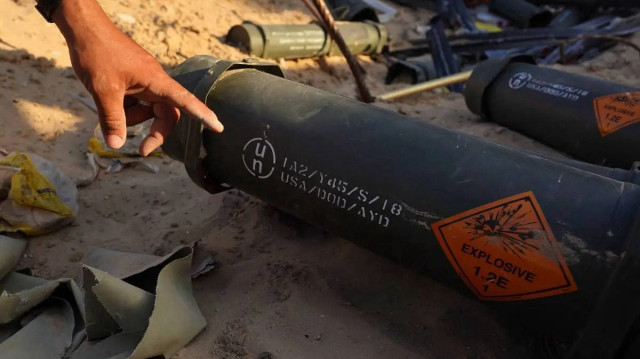
On Nov. 3, a group of 52 countries led by Türkiye sent a letter to the UN calling for an arms embargo on Israel, also urging the UN Security Council to act in the face of flagrant violations of its own resolutions
On Nov. 3, a group of 52 countries led by Türkiye sent a letter to the UN calling for an arms embargo on Israel. The letter also urges the UN Security Council to act in the face of flagrant violations of its own resolutions. In addition to Türkiye, the signatories include China, Russia, Iran, Saudi Arabia, Qatar, Palestine, and Brazil, as well as the Arab League and Organization of Islamic Cooperation (OIC).
-Establishing arms embargoes
The establishment of arms embargoes or sanction regimes by the UN requires that a resolution be adopted by the UN Security Council with a majority of 9 of its 15 members, including the five permanent members – the United States, China, UK, France, and Russia. As of November, nine arms embargoes are into force (Democratic Republic of Congo, Haiti, Iraq, Libya, North Korea, Lebanon, Sudan, South Sudan, and Yemen) on the basis of Security Council resolutions, as well as 14 sanction regimes.
For a resolution to be adopted by the council, one of its members must submit a text on which a vote then takes place. In the current instance, any of the three countries that currently sit on the council (China and Russia as permanent members and Algeria as elected members) and that have signed the letter calling for an arms embargo on Israel could theoretically draft a resolution and then put it to a vote. It is clear to everyone, though, that such a text would not be passed.
At the very least, the US would resort to its prerogative as a permanent council member to veto any draft resolution seeking sanctions on Israel. Since Oct. 7, 2023, the US has vetoed two Security Council draft texts on Israel: one proposed by Brazil calling for “humanitarian pauses” in Gaza (Oct. 18, 2023), and one sponsored by the United Arab Emirates calling for an “immediate ceasefire” in Gaza (Dec. 8, 2023).
In both cases, the US veto was expected, and the text was put to the vote mainly to demonstrate that the US would oppose what was sought by a large number of countries.
The same could happen in the present case, i.e., states could request that a draft resolution on an arms embargo against Israel be put to a vote within the UN Security Council with the objective to “name and shame” the countries that would then oppose it. But the process would not go much further.
-UN General Assembly route
Alternatively, a similar text could be submitted to the UN General Assembly, in which the 193 UN member states sit, except for Palestine, which is only a "non-member observer state" at the UN. There the resolution could well be adopted, thus reflecting the isolation of Israel and the US, as was already the case in September when the UN General Assembly adopted a text demanding that Israel bring to an end its “unlawful presence in the Occupied Palestinian Territory." However, the General Assembly resolution would suffer from its non-binding nature, meaning that states are not legally requested to implement it, or rather cannot be sanctioned for failing to do so.
Another option could be that the 52 signatories unilaterally decide to adopt sanctions on Israel. This would nonetheless have little impact on the countries that continue to transfer weapons to Israel. Up until 2023, the US (about two-thirds of Israel's arms imports) and Germany (about 30% of Israel's arms imports) were the top two suppliers of weapons to Israel.
A number of European states have stopped or significantly reduced the sale of weapons to Israel since October 2023. This includes the UK and France, while German sales seem to have fallen in the first half of 2024 before rising again.
-Still central UN role
What is interesting in both the Israel-Palestine and the Russia-Ukraine conflicts is how powerless the UN seems to be. Russia and Israel both blatantly violate international law without being constrained by UN bodies.
Nonetheless, while the Security Council has indeed been paralyzed in both cases, the combined actions of the UN secretary-general, General Assembly, International Court of Justice (ICJ) and the International Criminal Court (ICC) do converge towards the identification of recurrent and undeniable violations of international law. The fact that the UN Security Council does not endorse this does not change the veracity of what all other UN bodies assert.
*Opinions expressed in this article are the author's own and do not necessarily reflect Anadolu's editorial policy.

